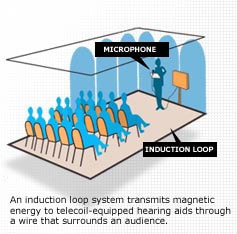Imagine attending an event – maybe it’s a speaker you have been anxious to hear or your granddaughter’s valedictorian speech at graduation-but, you can’t quite make out what they are saying. It’s not only frustrating; it can make you feel like you are missing out on a part of life. Hearing loss is quite common as we age. But is there a way for public places to compensate for this, and make the impact of gradual hearing loss less stressful? There is, and it’s called an Audio Frequency Induction Loop, or more commonly known, as a hearing loop.
Hearing loops have been gaining in popularity over the years, but many public places have yet to implement and install such systems into their buildings, not realizing the beneficial properties. However, the hearing impaired community has begun to demand these systems over traditional devices. Countless places of worship have begun the process of having these loop systems installed, recognizing the importance for both their members and themselves. Hearing loops work by wirelessly broadcasting sound from a sound system to the tT-coil in an individual’s hearing aid which acts as a receiver. Wi-Fi for the ear, if you will. Unlike traditional assisted listening systems which require a dedicated FM or IR transmitter and receivers with headphones, induction loops can be used by anyone in the room who has T-coil equipment hearing and the transmission of sound is more clear and concise.
The four primary advantages of an induction loop system for both the venue and the end user are its overwhelming convenience, quality of sound, the cosmetics of the system, and the privacy it provides. With the growing number of people in the age demographic experiencing hearing loss, having hearing loops placed in businesses, churches, schools, and theaters can encourage the entire population. No one likes to repeat themselves, nor do they want want to ask others to do so and continuously ask “What?” Unless science finally stumbles upon that long sought after fountain of youth, this technology will go a long way in ensuring the channels of communication remain clear for all in years to come.

